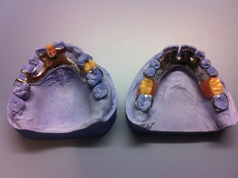What Are Dentures?
1. What are dentures?
Dentures are removable prosthetic devices used to replace a missing tooth or multiple teeth in the mouth. A more colloquial term is ‘false teeth’. They are commonly used after extractions or after loss of teeth due to trauma or missing teeth that never developed to begin with.
2. When are dentures indicated?
If there are missing teeth in the mouth and you would like to fill those gaps for aesthetic purposes, to aid in chewing and talking as well as to maintain cheek and lip tone, then dentures may be an option. They are also used as an alternative to fixed prostheses such as bridges or implants, as they could be more economical cost-to-tooth ratio in replacing multiple teeth. However, they do consume more space in the mouth.
3. Who can use dentures?
The vast majority of people with missing teeth are able to have them. Some exceptions exist, but ultimately each case is unique and requires assessment by your dentist to make a final decision on this.
4. What types of dentures are there?
In general, there are three different types.
a) Chrome – probably the most expensive but most durable- it is less intrusive than the other types but yet is very strong; However, it is difficult to add teeth onto this type of denture, should you have an existing chrome denture that will require additional tooth added to it after an extraction.

b) Acrylic resin – is the most intrusive in terms of size and thickness, but is approximately half the cost of a chrome denture; although it is bulky, it is relatively easy to add teeth onto.
c) Valplast – a flexible type of resin which is more comfortable than acrylic, but a little more expensive than acrylic; it, however, is not as intrusive as acrylic, yet it is as durable as chrome; it is probably a balance between cost and comfort/durability. This is just a simple comparison, however, speak with one of our dentists for more information and to find out which would best suit you.
5. Can you see a denture?
In most instances, more than 99% of a denture is hidden and it appears as just a great set of teeth. In some cases, such as a chrome denture, there may be visible at the front, two tiny metal ‘clasps’ that wrap around the teeth to secure the denture. They are usually quite tiny and hidden by the lip but they are about the only part that give away the fact that you have a denture. If this is a concern for you, speak to our dentists about having these clasps constructed in ceramic (tooth colour) and the pros and cons of doing this. For the most part, valplast dentures cannot be seen, and acrylic too; however, some acrylic dentures may also have clasps, as described above.
6. Can dentures be repaired or added to if I lose teeth?
It is not easy to add teeth onto a chrome denture. Although it can be done, the result is not as secure as adding onto an acrylic one. Valplast also suffers from this downside.
7. I am tired of having dental work done, can I just have all my teeth removed and have a set of dentures made?
In most cases this is highly discouraged. Although dentures are an alternative to natural teeth, they are not a replacement. Once a tooth is lost, the bone surrounding it will shrink significantly over the years to follow. With the loss of multiple teeth, a large proportion of bone loss and gum loss will take place which could significantly change your facial profile and give the appearance of premature ageing. In addition, the more natural teeth you have remaining, the more stable any prosthesis will be.
8. What if I have fillings done after the denture is made?
Although this is not an ideal situation, our dentists can custom shape your filling to fit under a pre-existing denture, although the fit is not as perfect as would be the case if a denture were constructed to conform to a pre-existing filling. Wedo strongly encourage that you have a comprehensive dental examination and have all fillings done prior to having dentures made, to ensure the fit of your denture is of the highest quality.
